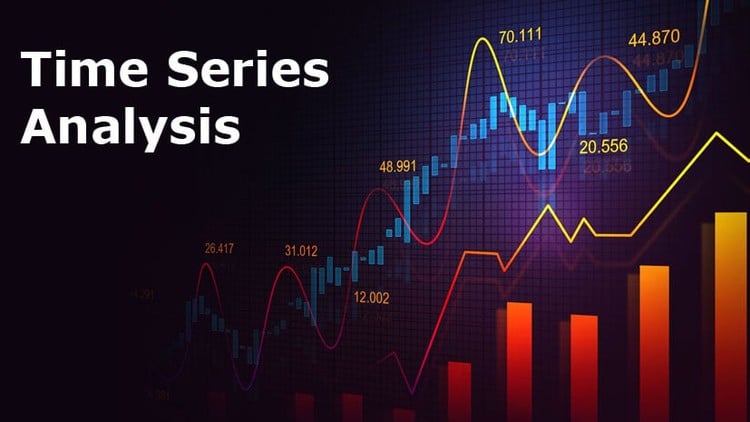
Master Time Series & Forecasting: ARIMA, SARIMA, Prophet, and Python for practical business predictions.
👥 6 students
Add-On Information:
Note➛ Make sure your 𝐔𝐝𝐞𝐦𝐲 cart has only this course you're going to enroll it now, Remove all other courses from the 𝐔𝐝𝐞𝐦𝐲 cart before Enrolling!
- Course Overview
- This intensive course offers a practical deep dive into time series analysis and forecasting, equipping you with essential skills to interpret temporal data and predict future outcomes for business strategy. It expertly blends foundational statistical models like ARIMA and SARIMA with modern, robust frameworks such as Facebook’s Prophet, all implemented hands-on using Python. Focusing on real-world business predictions across finance, sales, and operations, the program transforms raw data into actionable intelligence. The intimate setting with only 6 students ensures personalized guidance and an interactive learning environment, maximizing your understanding and application of complex forecasting methodologies critical for data-driven decision-making in various industries.
- Requirements / Prerequisites
- Participants should possess a foundational understanding of basic statistical concepts, including descriptive statistics (mean, median, standard deviation) and elementary inferential methods (hypothesis testing). A comfortable working knowledge of Python programming is crucial, encompassing core syntax, control structures, data structures (lists, dictionaries), and familiarity with essential libraries like NumPy for numerical operations and Pandas for data manipulation. No prior experience specifically in time series analysis is required, as the course meticulously builds from fundamental principles. A strong analytical mindset and genuine enthusiasm for solving business problems with data will significantly enhance your learning experience throughout the program.
- Skills Covered / Tools Used
- Time Series Data Preprocessing: Master techniques for cleaning, structuring, and transforming raw time series data. This includes effective handling of missing values through various imputation strategies, robust outlier detection and treatment, resampling data to different frequencies, and achieving stationarity—a critical prerequisite for many classical forecasting models.
- Exploratory Data Analysis (EDA) for Time Series: Learn to effectively visualize and interpret inherent time series characteristics. You’ll utilize Autocorrelation Function (ACF) and Partial Autocorrelation Function (PACF) plots for identifying underlying patterns, alongside time series decomposition methods to clearly isolate trend, seasonality, and residual components.
- Classical Statistical Forecasting with ARIMA: Gain proficiency in building, fitting, and interpreting ARIMA (AutoRegressive Integrated Moving Average) models. This involves understanding the identification of appropriate p, d, q parameters and performing thorough diagnostic checks for model validity and reliability.
- Seasonal Forecasting with SARIMA: Extend your capabilities to SARIMA (Seasonal ARIMA) models, expertly capturing and forecasting data with distinct seasonal patterns. You will learn to identify and incorporate the additional seasonal parameters (P, D, Q, S) to significantly enhance prediction accuracy for periodic data.
- Modern Business Forecasting with Prophet: Develop expertise in using Facebook’s Prophet, a robust and scalable forecasting library specifically designed for business applications. Learn its intuitive API for modeling trends, multiple seasonalities, holidays, and automatic changepoint detection to handle complex real-world data.
- Model Evaluation & Validation: Acquire the critical skills to rigorously assess forecast accuracy and model robustness. You will apply a suite of key metrics such as Mean Absolute Error (MAE), Root Mean Squared Error (RMSE), and Mean Absolute Percentage Error (MAPE, and implement robust time series cross-validation and backtesting strategies.
- Python Ecosystem Mastery: Leverage the full power of Python’s data science stack. This includes extensive use of Pandas for efficient data manipulation and time series indexing, NumPy for high-performance numerical computing, Matplotlib and Seaborn for insightful data visualization, Statsmodels for implementing ARIMA and SARIMA, and the dedicated Fbprophet library for cutting-edge Prophet modeling.
- Benefits / Outcomes
- Upon successful completion, graduates will be fully equipped to independently design, implement, and critically evaluate end-to-end time series forecasting projects. You will possess a versatile toolkit of models (ARIMA, SARIMA, Prophet) and the analytical acumen to translate complex temporal patterns into actionable business insights. This course significantly enhances your problem-solving abilities in predictive analytics, boosting your career readiness for roles in data science, business intelligence, and strategic planning. You will gain confidence in making data-driven recommendations that impact core business functions and demonstrate practical proficiency in Python for advanced temporal analytics, contributing measurable value to any organization.
- PROS
- Personalized Learning Experience: The exceptionally small class size (6 students) ensures unparalleled one-on-one attention from the instructor, fostering a highly interactive and supportive learning environment where individual queries are addressed comprehensively.
- Direct Business Relevance: The curriculum is meticulously crafted to bridge the gap between theoretical knowledge and practical business challenges, emphasizing how to leverage forecasting to drive tangible value and inform strategic decision-making in real-world scenarios.
- Comprehensive Model Coverage: Participants gain proficiency in both established statistical methodologies (ARIMA, SARIMA) and cutting-edge, industry-relevant frameworks (Prophet), providing a versatile and robust arsenal for tackling diverse forecasting problems.
- Hands-on Python Implementation: The course strongly emphasizes practical, coding-centric exercises using Python, enabling students to immediately apply learned concepts and build a tangible portfolio of forecasting projects directly applicable to industry roles.
- High Demand Skillset Acquired: Acquiring these sought-after analytical and predictive skills significantly boosts career prospects in rapidly expanding fields such as data science, financial analysis, supply chain management, and marketing analytics, making you a competitive candidate.
- CONS
- Potentially Intensive Learning Curve: Given the comprehensive coverage of multiple advanced models and practical Python implementation within the course structure, the learning pace might feel intensive for individuals with minimal prior exposure to either Python programming or fundamental statistical concepts, potentially requiring dedicated self-study outside of class hours to keep up effectively.
Learning Tracks: English,IT & Software,Other IT & Software
Found It Free? Share It Fast!